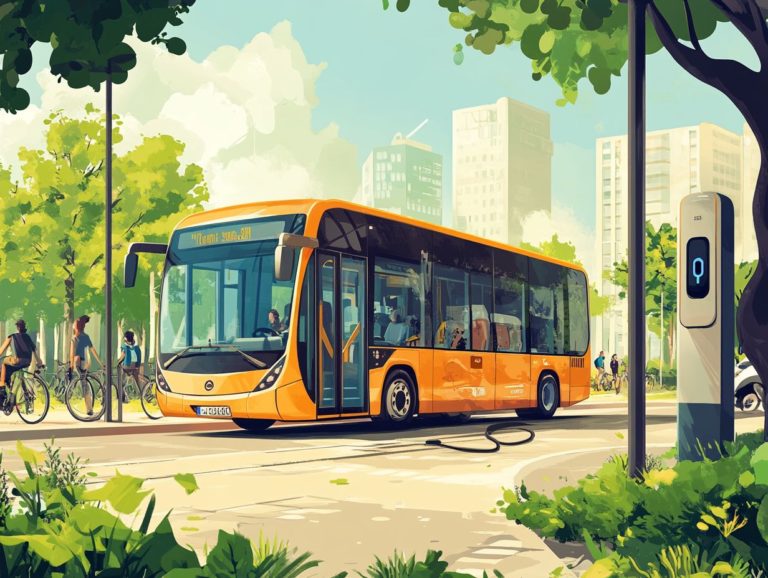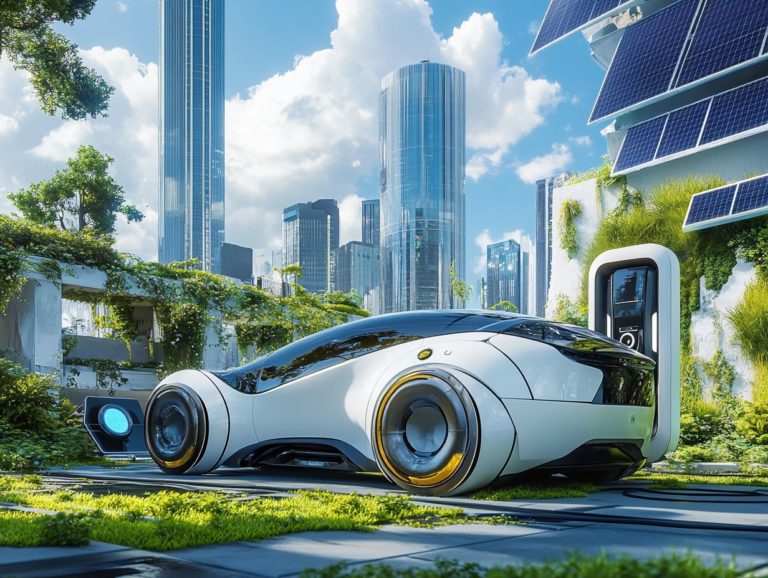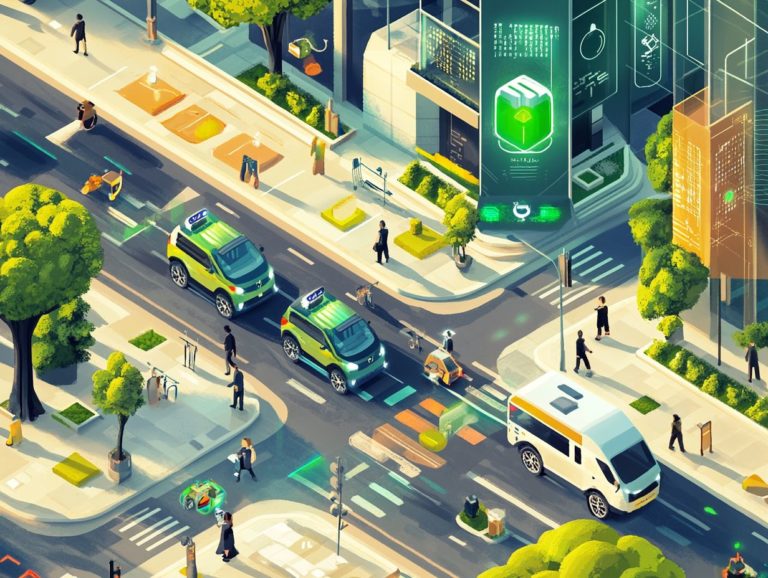5 Game-Changing EV Technologies on the Horizon
As electric vehicles (EVs) redefine transportation, innovative technologies are set to elevate them even further.
Imagine solid-state batteries that enhance efficiency and prioritize safety. Picture wireless charging that streamlines your daily routine. The future of EVs is brimming with potential.
Consider the transformative power of vehicle-to-grid technology, which could revolutionize energy consumption. There s also the rise of autonomous driving, bringing thrilling opportunities and intricate challenges.
Let s not forget solar-powered vehicles, which may redefine sustainability on the road. Dive into these advancements and discover their potential impact on the EV industry in our detailed exploration.
Contents
- Key Takeaways:
- 1. Solid-State Batteries
- 2. Wireless Charging
- 3. Vehicle-to-Grid Technology
- 4. Autonomous Driving
- 5. Solar-Powered Vehicles
- What Are the Current Challenges in EV Technology?
- Frequently Asked Questions
- What are the 5 game-changing EV technologies on the horizon?
- What are solid-state batteries and how can they change the EV industry?
- What is wireless charging and how can it help EV owners?
- How does vehicle-to-grid technology work and what impact can it have on the EV market?
- How can artificial intelligence enhance the performance of EVs?
- What role will autonomous driving play in the future of EVs?
Key Takeaways:
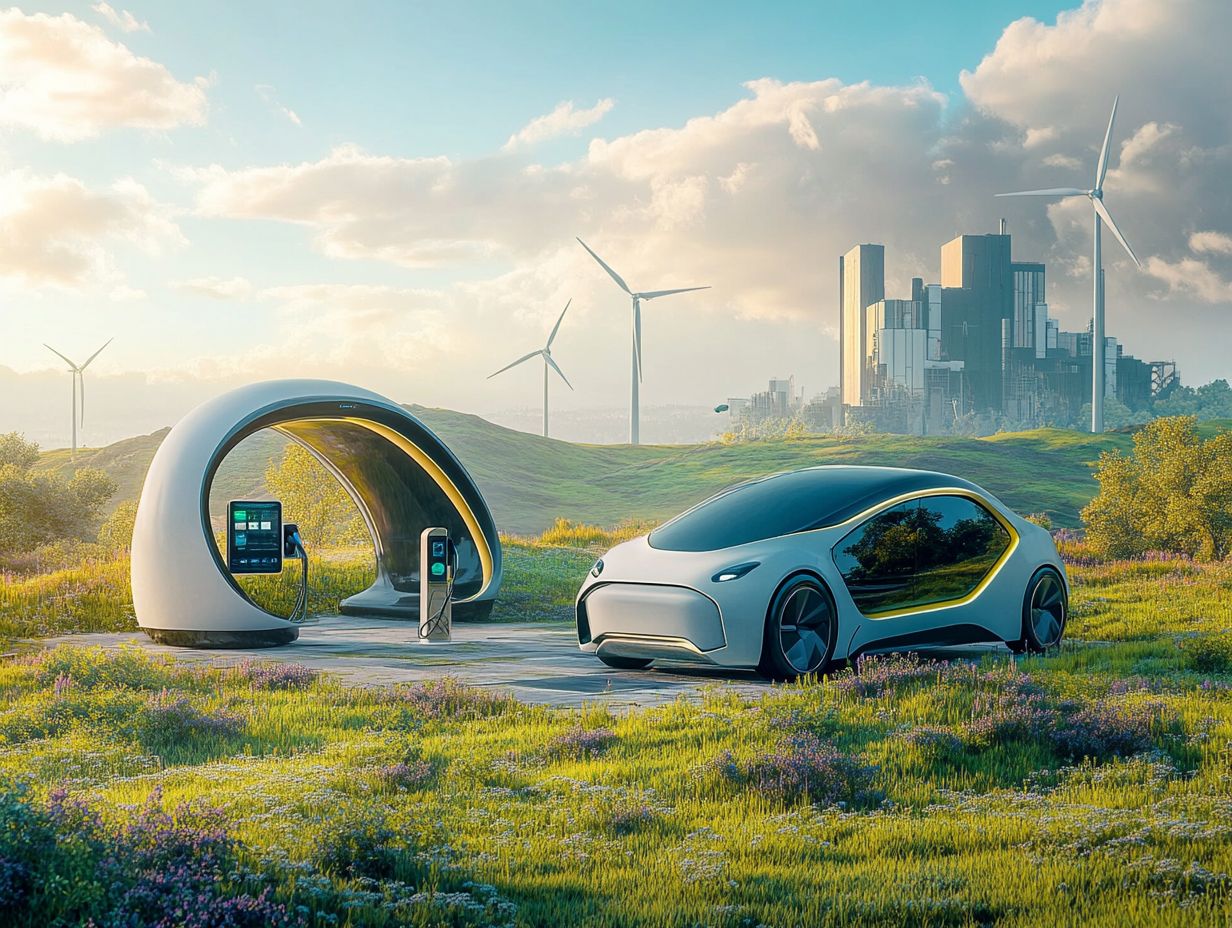
- Solid-state batteries promise to vastly improve your EV range and lifespan!
- Wireless charging eliminates the hassle of plug-in chargers, offering a seamless charging experience.
- Vehicle-to-grid technology allows EVs to share energy back to the grid, potentially lowering energy costs.
1. Solid-State Batteries
Solid-state batteries represent a groundbreaking advancement in battery technology. They are set to revolutionize the electric vehicle (EV) industry by offering enhanced safety and remarkable energy density.
These batteries charge faster than conventional lithium-ion batteries. Key players like NanoBolt and QuantumScape are leading the way with innovative solid electrolytes. This design significantly reduces the risks of leakage and combustion while optimizing performance.
Tesla and General Motors are pouring resources into solid-state technology, making better range and efficiency for electric vehicles a reality.
This next generation of batteries tackles safety concerns and enables substantial increases in energy density. Manufacturers can design lighter vehicles that travel longer distances on a single charge.
For instance, QuantumScape has reported breakthroughs in energy density that could dramatically enhance future EV models’ range capabilities. Additionally, Tesla is actively exploring solid-state solutions to minimize charging times, which is part of the innovative technologies making EVs greener, encouraging consumer adoption.
As these emerging technologies rapidly evolve, they promise to reshape market dynamics, making electric vehicles not just sustainable but also practical and attractive for you.
2. Wireless Charging
Wireless charging technology is swiftly becoming a highly convenient and efficient solution for electric vehicles (EVs). This technology allows you to power up your car without the hassle of cables or plugs.
This innovative approach includes several methods. Inductive charging transfers energy between coils, while resonant charging accommodates greater distances between the charger and your vehicle.
By integrating with advanced driver-assistance systems (ADAS), these technologies simplify the recharging process and enhance safety and navigation features.
Wireless charging solutions deliver energy more quickly, cutting down downtime for you as an EV owner. As these systems evolve and gain traction, their convenience could play a pivotal role in shaping user acceptance and driving mainstream adoption of electric vehicles.
Stay updated on the latest advancements in EV technology!
3. Vehicle-to-Grid Technology
Vehicle-to-grid technology represents a groundbreaking leap for electric vehicles (EVs). It enables them to do more than just consume energy; they can also channel it back to the grid. This optimizes energy management while significantly reducing environmental impact an urgent need for our planet!
Imagine your EV as a mobile energy storage unit. It actively balances the supply and demand on the electrical grid. When energy production outstrips consumption, your vehicle can effortlessly feed excess energy back into the system, helping to stabilize the grid during peak demand periods. Incorporating second-use batteries those that once powered your EV enhances this innovative setup.
By repurposing these batteries for stationary energy storage systems, you extend the lifecycle of battery technologies. This contributes to resource efficiency and minimizes waste. Ultimately, this synergy creates a sustainable energy ecosystem and curbs carbon emissions, reinforcing your commitment to a greener future.
4. Autonomous Driving
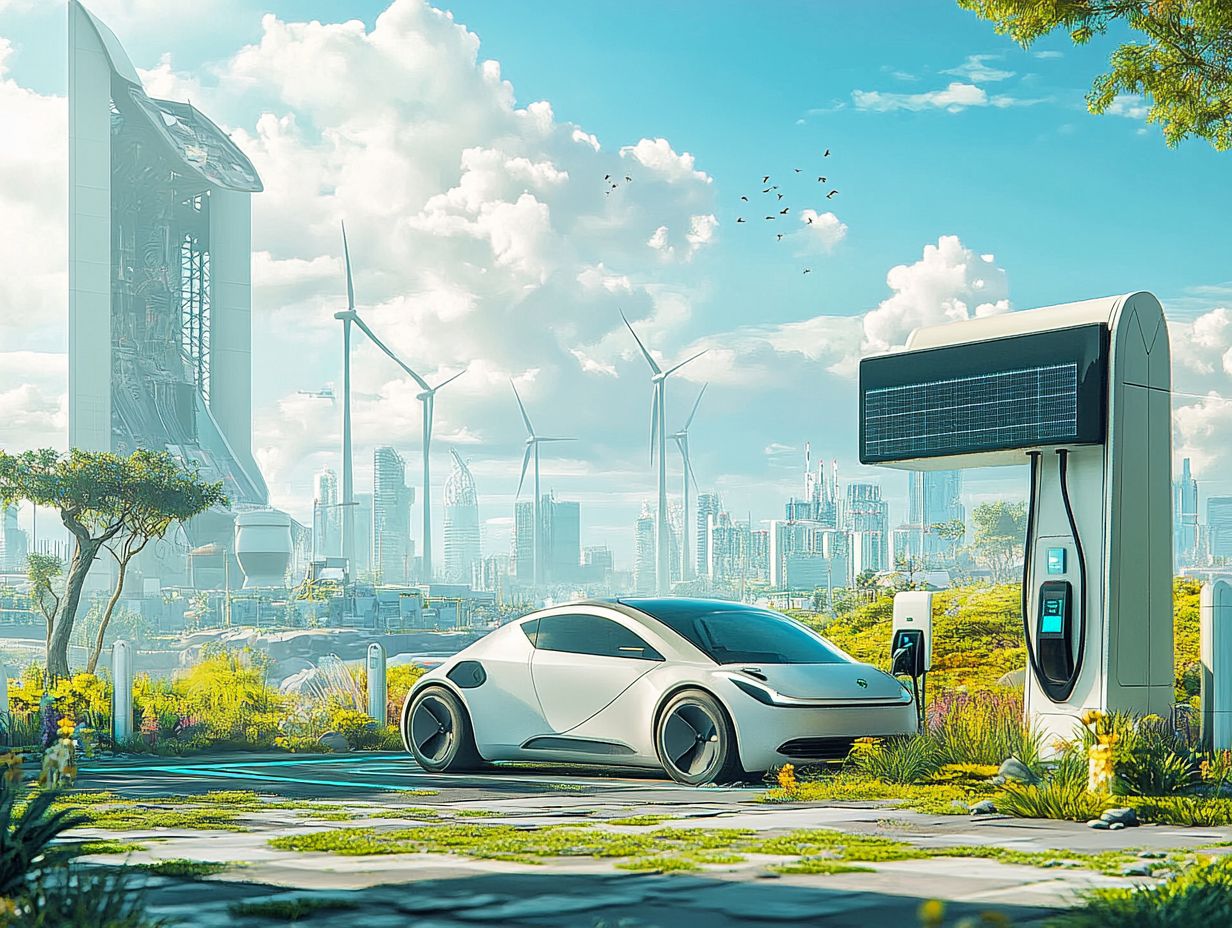
Autonomous driving technology is transforming the transportation landscape, particularly within the electric vehicle (EV) sector. It seamlessly integrates advanced driver-assistance systems (ADAS) to enhance safety, efficiency, and user convenience.
In this swiftly evolving arena, features like lane-keeping assist and adaptive cruise control are becoming the new norm. They offer you a more relaxed and secure driving experience. Companies such as Tesla are leading the charge, pioneering innovations like Full Self-Driving (FSD) that redefine what vehicles can achieve.
As you become more aware of these advancements, your perceptions of electric vehicles are likely shifting. Many now see them not merely as eco-friendly alternatives but as sophisticated machines that prioritize safety. For insights on what to expect from EV technology advances, this growing acceptance is poised to accelerate EV adoption, fueling competition and driving further enhancements in autonomous technologies throughout the industry.
5. Solar-Powered Vehicles
Solar-powered vehicles embody a remarkable fusion of renewable energy and cutting-edge electric vehicle technology. They utilize solar energy to enhance driving ranges and decrease dependence on traditional charging infrastructures.
By integrating photovoltaic cells devices that convert sunlight into electricity into the vehicle’s surface, these sophisticated machines capture sunlight and convert it into electrical energy. This not only powers the vehicle but also feeds the battery, boosting overall energy efficiency.
Leading manufacturers like Tesla and Lightyear are exploring this technology. They showcase how solar panels can harmoniously work with existing battery systems to provide alternative charging solutions. Solar-powered vehicles are setting the stage for quicker charging options, reducing downtime and maximizing driving potential, all while significantly shrinking your carbon footprint.
What Are the Current Challenges in EV Technology?
The electric vehicle (EV) industry is currently navigating a landscape filled with challenges. Limitations in battery technologies, the pressing need for effective recycling methods, and the substantial environmental impact tied to battery production and disposal are significant hurdles. However, the upcoming 5 most anticipated electric cars of 2024 may help address some of these issues, potentially boosting widespread adoption and performance enhancements.
These challenges extend beyond mere technical issues; they are deeply entangled with economic and ecological factors. These can undermine consumer confidence and stifle industry growth. The high costs associated with advanced battery systems often deter investment, making EVs less accessible for many potential buyers. The lack of efficient recycling methods also increases environmental risks, as outdated technologies contribute to waste and pollution.
Fortunately, innovative research initiatives such as those led by institutions like the University of Wisconsin-Madison are tackling these pressing issues head-on! They are exploring alternative materials and recycling solutions to pave the way for a sustainable and efficient future for electric mobility. Don t miss out on following their progress!
How Will Solid-State Batteries Change the Game for EVs?
Solid-state batteries are set to revolutionize the electric vehicle (EV) market! They offer greater energy storage and improved safety features that outperform traditional lithium-ion batteries. This innovation is truly a game changer for the industry.
These advanced systems use a solid electrolyte instead of a liquid one, which significantly decreases the risk of fires and increases the battery’s lifespan. Companies like NanoBolt are leading the way, developing batteries that not only last longer but also recharge incredibly quickly.
For EV manufacturers, this means they can create lighter vehicles with greater range. As a consumer, you can enjoy the peace of mind knowing your vehicle is equipped with safer technology. As production increases, the broader implications may lead to a more widespread adoption of electric vehicles, ultimately transforming the transportation landscape.
What Are the Benefits of Wireless Charging for EVs?
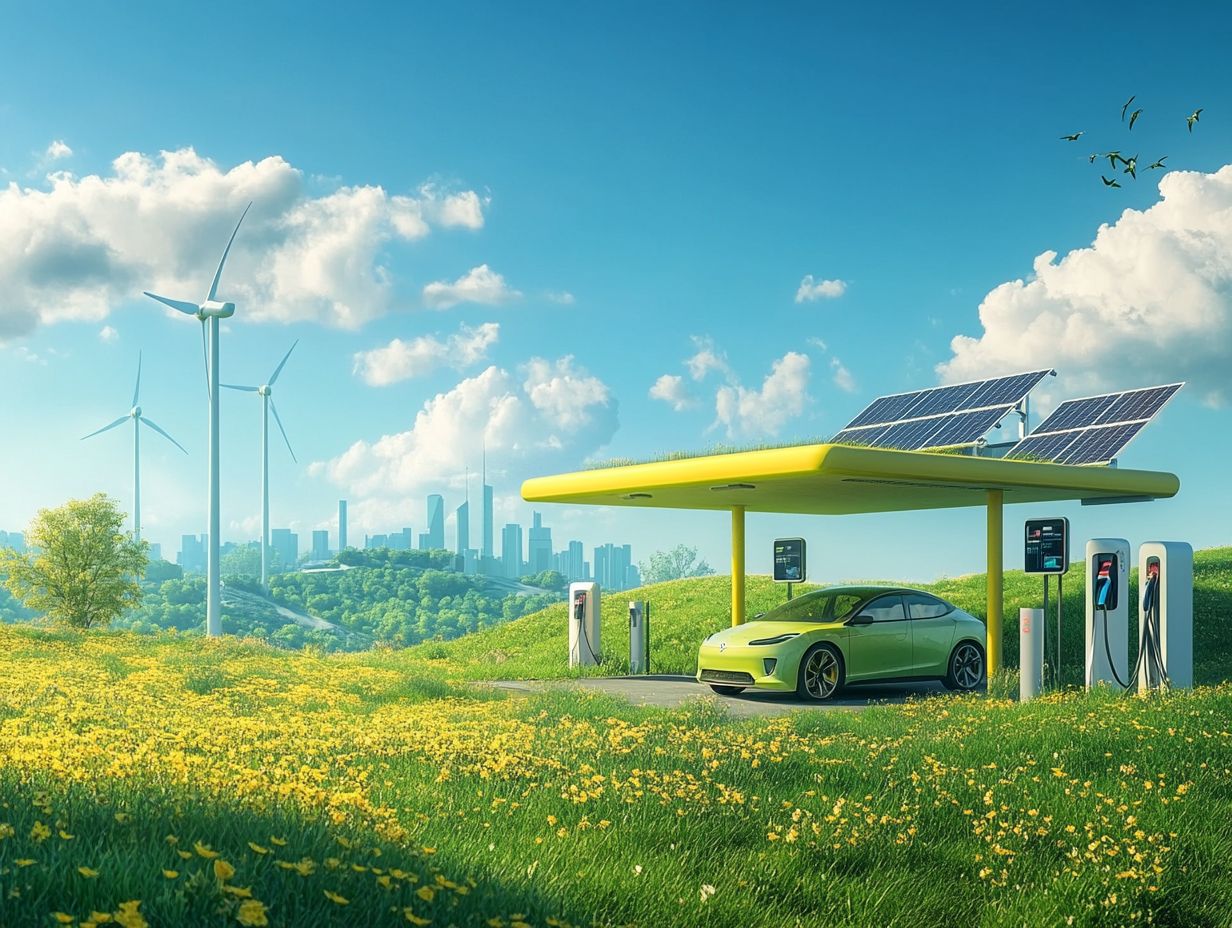
Wireless charging for electric vehicles (EVs) offers unmatched convenience! It allows for rapid charging and eliminates the hassle of physical connectors, which enhances your overall user experience.
This technology not only streamlines the charging process but also integrates seamlessly with smart home systems and public infrastructure. As more cities introduce wireless charging stations, you can enjoy the efficiency of charging on-the-go without the tediousness of plugging and unplugging.
The industry is advancing quickly, leading to faster charging rates. This makes it possible for your EV to gain significant power boosts in just a few minutes! This growing trend not only supports a more sustainable future but also encourages you to embrace electric vehicles, knowing that convenience and speed are prioritized in your driving experience.
How Will Vehicle-to-Grid Technology Revolutionize the EV Industry?
Vehicle-to-grid technology is set to transform the electric vehicle (EV) landscape! It enables your vehicle to communicate with the energy grid seamlessly. This innovation optimizes energy management and supports a more sustainable future.
Imagine your electric vehicle drawing energy from the grid during off-peak hours, then sending stored energy back during peak demand times. It s truly a game changer. By integrating renewable energy sources, such as solar and wind, vehicle-to-grid technology improves power distribution and reduces dependence on fossil fuels.
As a consumer, you can enjoy potential savings on your energy bills and enticing incentives for participating! The broader energy ecosystem also benefits significantly, enhancing grid stability and lowering the carbon footprint. This synergy between transportation and energy management marks a notable step toward sustainable living.
What Are the Implications of Autonomous Driving for EVs?
The rise of autonomous driving technology brings significant implications for electric vehicles (EVs). It enhances safety, efficiency, and the overall driving experience while pushing the limits of automation and smart transportation.
As more manufacturers invest in advanced driver-assistance systems (ADAS), we are witnessing the dawn of a new era in intelligent mobility. These systems not only improve vehicle responsiveness but also collect valuable data to refine algorithms for safer navigation.
With electric vehicles embracing this technological synergy, the dream of fully autonomous models reshaping urban commuting is becoming more realistic. Picture a future where vehicles effortlessly communicate with one another, reducing traffic congestion and minimizing accidents! This will lead to a more sustainable and efficient transportation ecosystem that benefits everyone.
How Will Solar-Powered Vehicles Impact the Future of Transportation?
Solar-powered vehicles are ready to change the way we travel! By harnessing renewable energy sources, this shift reduces reliance on fossil fuels and minimizes the environmental impact typically associated with conventional vehicles.
These cutting-edge vehicles capture sunlight to generate electricity. They position themselves as a sustainable alternative to existing electric vehicles. With recent advancements in solar panel technology, these vehicles now work better, and production costs have dropped, making them easier to start using.
Real-world applications are already on the rise. Companies are actively testing solar-integrated cars and innovative public transportation systems. By combining solar power with traditional electric systems, these vehicles also present a greener solution and help ease the burden on charging infrastructure, fostering a more resilient and adaptable approach to sustainable mobility.
Watch this video to see solar-powered vehicles in action!
Frequently Asked Questions
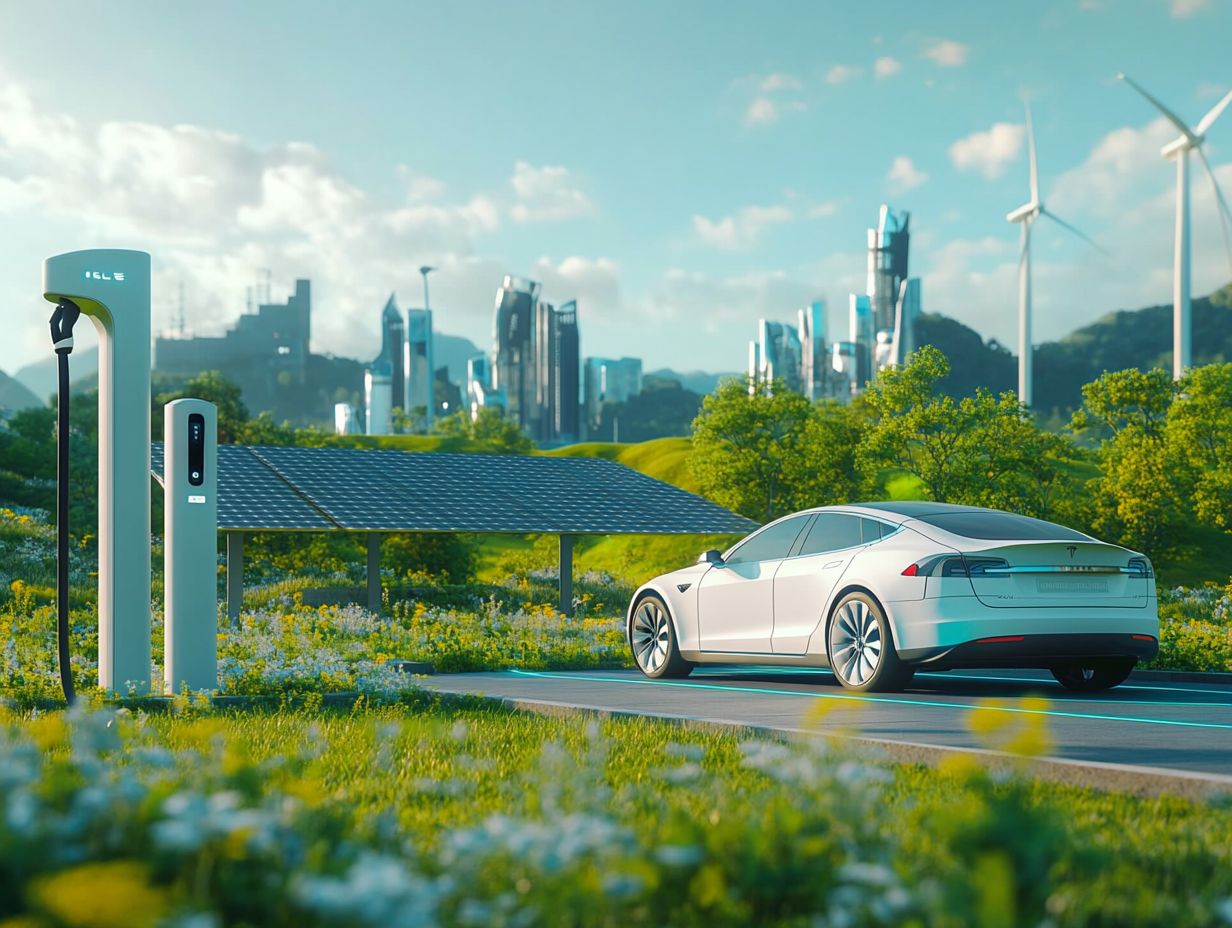
What are the 5 game-changing EV technologies on the horizon?
The 5 game-changing EVs to watch for in 2024 include solid-state batteries, wireless charging, vehicle-to-grid technology, artificial intelligence, and autonomous driving.
What are solid-state batteries and how can they change the EV industry?
Solid-state batteries are a new type of battery that uses solid electrodes and a solid electrolyte, unlike traditional lithium-ion batteries that use liquid electrolytes. They are expected to have higher energy density, longer lifespan, and faster charging times, making them a game-changing technology for EVs.
What is wireless charging and how can it help EV owners?
Wireless charging involves transferring energy to an EV’s battery without a physical connection. This technology can greatly help EV owners as it eliminates the inconvenience of plugging in and unplugging their vehicles, and it also reduces wear and tear on charging equipment.
How does vehicle-to-grid technology work and what impact can it have on the EV market?
Vehicle-to-grid technology allows EVs to consume energy and also send energy back to the grid. This means that EV owners can potentially earn money by selling excess energy from their vehicles to the grid, making EVs even more cost-effective and appealing to consumers.
How can artificial intelligence enhance the performance of EVs?
Artificial intelligence (AI) can optimize energy usage, improve driving efficiency, and enhance safety in EVs. With AI, EVs can learn their owners’ driving habits and adapt to different road and weather conditions, making them more efficient and reliable.
What role will autonomous driving play in the future of EVs?
Autonomous driving technology is expected to play a major role in the future of EVs. With self-driving capabilities, EVs can reduce the risk of accidents, improve traffic flow, and increase convenience for drivers. Additionally, this technology aligns with the 5 reasons why EVs are the future of transportation, opening up opportunities for new models, such as autonomous ride-sharing services.

